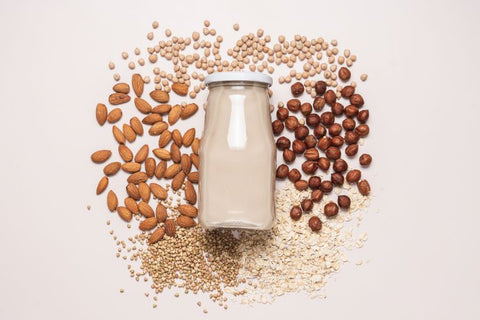Protein powder, once synonymous with whey derived from cow's milk, has seen a significant shift in recent years. Plant-based protein powders, formulated from various plant sources, are rapidly gaining popularity. But what exactly are they, and why are they attracting so much interest?
In this article, we will explore the benefits and versatility of plant-based protein powders, addressing common misconceptions, discussing their nutritional value, and highlighting their suitability for various dietary needs.
Source of Protein
These powders are exactly what the name suggests - protein supplements derived from plants. Common sources include peas, brown rice, hemp, soy, and even certain grains and seeds. Each source offers a unique protein profile, with some containing a complete set of essential amino acids (the building blocks of protein) and others requiring combination for a more comprehensive profile.
Why the Growing Appeal?
Several factors contribute to the rise of plant-based protein powders:
- Vegan and Vegetarian Lifestyles: With a growing number of people adopting vegan or vegetarian diets, the demand for plant-based alternatives to traditional protein sources has surged. Plant-based powders provide a convenient way to meet protein requirements without compromising dietary choices.
- Lactose Intolerance and Allergies: Whey protein can be problematic for those with lactose intolerance or dairy allergies. Plant-based powders offer a solution, allowing individuals with these sensitivities to reap the benefits of protein supplementation.
- Potential Health Benefits: Certain plant-based protein sources like soy and hemp offer additional health benefits beyond protein. Soy protein, for example, may contribute to heart health, while hemp is a good source of fiber and omega-3 fatty acids.
- Sustainability Concerns: The environmental impact of animal agriculture is a growing concern. Plant-based protein production generally has a smaller environmental footprint compared to animal-derived protein sources, appealing to environmentally conscious consumers.
- Taste and Texture: Gone are the days of chalky, unpleasant-tasting plant-based protein powders. Modern formulations offer a variety of delicious flavors and smooth textures, making them a versatile ingredient for shakes, smoothies, and even baking.
Types of Plant-Based Protein Powders
There are many exciting options to explore when it comes to plant-based protein powders. Here's a breakdown of some of the most common types, each with its unique set of benefits and drawbacks:
1. Pea Protein Powder
- Protein Content: Around 80% per serving
- Benefits: Highly digestible, hypoallergenic (great for those with soy allergies), good source of iron and BCAAs (branched-chain amino acids), considered a complete protein.
- Drawbacks: Can have a slightly earthy or grassy taste (masked well in flavored varieties).
2. Soy Protein Powder
- Protein Content: Around 90% per serving
- Benefits: Complete protein, a good source of all essential amino acids, versatile and affordable, may offer heart-health benefits.
- Drawbacks: Some may have concerns about soy due to potential hormonal effects (limited research), not suitable for those with soy allergies.
3. Brown Rice Protein Powder
- Protein Content: Around 70% per serving
- Benefits: Hypoallergenic, good source of fiber, easily digestible, blends well.
- Drawbacks: Not a complete protein (low in lysine), may have a chalky taste (look for flavored options).
4. Hemp Protein Powder
- Protein Content: Around 50% per serving (but also contains all nine essential amino acids)
- Benefits: Good source of fiber and omega-3 fatty acids, easily digestible, nutty flavor.
- Drawbacks: Not a complete protein (low in lysine), lower protein content compared to other options.
5. Seed Protein Powders
This category encompasses various seed-based powders like pumpkin seed, sunflower seed, and chia seed protein.
- Protein Content: Varies depending on the seed source (generally around 50-60% per serving)
- Benefits: Excellent source of fiber, minerals, and healthy fats, depending on the seed type.
- Drawbacks: Not complete proteins, generally lower protein content.
6. Plant Protein Blends
Many brands offer protein powders that combine various plant sources, often including pea, brown rice, and hemp protein.
- Benefits: Provides a more complete amino acid profile, offers a wider range of nutrients from different sources, and can improve taste and texture.
- Drawbacks: Protein content and nutrient profile can vary depending on the blend, be sure to check the label.
Vegan and Vegetarian-Friendly
Plant-based protein powders are highly suitable for vegans and vegetarians. These protein supplements are derived entirely from plants, making them free from animal products. As such, they align perfectly with the dietary restrictions of individuals following vegan or vegetarian lifestyles.
How do they accommodate dietary preferences and needs?
Plant-based protein powders accommodate various dietary preferences and needs in several ways:
- Animal-free: They contain no animal-derived ingredients, ensuring compliance with vegan and vegetarian diets.
- Allergen-free options: Many plant-based protein powders are free from common allergens such as dairy, gluten, and soy, catering to individuals with specific allergies or sensitivities.
- Digestibility: Plant-based proteins are often easier to digest than animal-based proteins, making them suitable for individuals with digestive issues or sensitivities.
- Nutrient-rich: Plant-based protein powders may also contain additional fiber and nutrients, contributing to a well-rounded nutritional profile and meeting the diverse dietary needs of individuals.
Allergen-Free
Individuals with allergies or sensitivities face unique challenges when it comes to protein supplementation. Thankfully, the world of plant-based protein powders offers several options to cater to these needs:
1. Allergen-Free Formulations
Manufacturers are increasingly aware of the growing demand for allergen-free protein powders. Many brands now offer powders specifically formulated to be free from common allergens like dairy, gluten, and soy. These powders often utilize protein sources like pea protein, brown rice protein, hemp protein, and even seed-based protein blends (pumpkin seed, sunflower seed) which are naturally free from the big three allergens.
2. Clear Labeling and Transparency
Reputable brands prioritize clear labeling, highlighting the absence of common allergens on their packaging and website. This transparency allows consumers to easily identify products that suit their specific needs.
3. Certifications
Look for certifications on the label that verify the absence of specific allergens. Certifications like "dairy-free," "gluten-free," and "soy-free" can provide peace of mind for those with allergies.
4. Considering Additional Sensitivities:
While dairy, gluten, and soy are the most common concerns, some individuals might have sensitivities to other ingredients like nuts or certain seeds. Carefully examine the ingredient list to avoid any potential triggers.
Digestibility
There are a few reasons why plant-based proteins can be easier to digest than some animal-based proteins, making them a better choice for those with digestive sensitivities:
1. Absence of Lactose
Lactose is a sugar naturally found in milk and dairy products. Individuals with lactose intolerance lack sufficient lactase, the enzyme needed to break down lactose. This can lead to digestive discomfort like bloating, gas, and diarrhea. Plant-based protein powders are naturally lactose-free, eliminating this potential irritant for those with lactose intolerance.
2. Fiber Content
Many plant-based protein sources, especially those derived from whole grains and seeds, are naturally higher in fiber. While some types of fiber can be difficult to digest for certain individuals, others, like soluble fiber, can promote smoother digestion by aiding in the movement of food through the digestive system. This can be beneficial for those experiencing constipation or sluggish digestion.
3. Fat Content
Animal-based protein sources, particularly red meat, can be higher in fat content compared to some plant-based options. Fat, especially saturated fat, can take longer to digest and put a strain on the digestive system. Plant-based protein powders typically have lower overall fat content, making them potentially easier to tolerate for those with digestive sensitivities.
4. Protein Source and Processing
The specific plant source and processing methods can also play a role in digestibility. For example, pea protein is generally considered highly digestible due to its hypoallergenic nature and easily absorbed amino acid profile. Conversely, certain processing methods used for soy protein can potentially make it less digestible for some individuals.
Rich in Fiber and Nutrients
Plant-based protein powders offer a unique advantage over some animal-based protein sources by going beyond just protein content. Here's how they can contribute to overall health by providing additional fiber and nutrients:
Fiber Powerhouse:
Many plant-based protein powders, especially those derived from whole grains (brown rice protein) and seeds (chia seed protein), boast a significant fiber advantage. Fiber plays a crucial role in digestion by promoting regularity, gut health, and feelings of satiety. It can also help regulate blood sugar levels and potentially lower cholesterol.
Nutrient Boost:
Depending on the source, plant-based protein powders can offer a variety of essential vitamins, minerals, and antioxidants.
- Vitamins: Some powders, particularly those from legumes (soy protein) or certain seeds (hemp protein), may contain B vitamins, iron, and even vitamin K.
- Minerals: Plant-based sources like hemp protein can be rich in minerals like magnesium and iron.
- Antioxidants: Certain plant proteins, like those from berries (goji berry protein) or some seeds (chia seed protein), may boast a good amount of antioxidants that can help protect your cells from damage.
Synergistic Benefits
The combination of protein, fiber, and other nutrients in plant-based protein powders can offer synergistic benefits. For example, fiber can help slow down protein digestion, leading to a more sustained release of amino acids into the bloodstream, potentially promoting muscle growth and repair.
Examples:
- Brown Rice Protein: A good source of fiber and some B vitamins.
- Hemp Protein: Contains all essential amino acids (with slightly lower protein content), is rich in fiber, and offers omega-3 fatty acids and some minerals.
- Pea Protein: Highly digestible and hypoallergenic, with a good amount of iron and branched-chain amino acids (BCAAs).
Environmental Sustainability
When it comes to environmental impact, plant-based protein powders shine compared to animal-based protein sources. Here's why eco-conscious consumers might choose them:
Environmental Footprint
- Animal Agriculture's Impact: Raising livestock for protein has a significant environmental footprint. It contributes to deforestation for grazing land, greenhouse gas emissions, and water pollution from manure runoff.
- Plant-Based Advantage: Plant-based protein sources generally require less land, water, and resources to produce. This translates to a smaller environmental footprint for plant-based protein powders.
Resource Conservation
- Water Savings: Animal agriculture is a major water consumer. Plant-based proteins require significantly less water to cultivate, making them a more sustainable choice in areas facing water scarcity.
- Land-Use Efficiency: Livestock production often requires vast swathes of land. Plant-based protein sources generally can be cultivated on less land, allowing for more efficient land use.
Reduced Emissions
- Greenhouse Gas Impact: Animal agriculture is a significant contributor to greenhouse gas emissions, including methane from enteric fermentation in cows. Plant-based protein production generally has a lower carbon footprint.
For consumers who are mindful of their environmental impact, plant-based protein powders offer a clear advantage. By choosing plant-based protein, they can contribute to a more sustainable food system that uses fewer resources and reduces greenhouse gas emissions.
Varied Flavors and Forms
Beyond the muscle-building benefits, plant-based protein powders offer a convenient way to boost your protein intake on a vegan or vegetarian diet. But with so many options on the market, you might be wondering what forms and flavors these powders come in. Let's explore the different formats available and the exciting world of flavors to help you find the perfect plant-based protein powder for you.
Forms
- Powder: This is the most common form. It's versatile and can be easily mixed into smoothies, shakes, yogurt, oatmeal, or even baked goods.
- Pre-portioned packets: These single-serving packets offer convenience and portion control, perfect for on-the-go use.
- Ready-to-drink beverages: Pre-made shakes or drinks containing plant-based protein are a convenient grab-and-go option, but may have a shorter shelf life and might be less cost-effective than buying powder.
Flavors
Plant-based protein powders come in a vast array of flavors, ranging from classic options like chocolate and vanilla to more adventurous choices like peanut butter banana, matcha green tea, or even fruity blends like berries and cream. You can also find unflavored versions for those who prefer to customize the taste by adding their fruits, vegetables, or flavorings.
Balanced Nutrition
Plant-based protein powders can be a helpful tool for people looking to boost their protein intake as part of a balanced diet:
- Meeting Protein Needs: These powders offer a concentrated source of protein from plants like soy, pea, brown rice, or hemp. This can be especially useful for vegans, vegetarians, or people who struggle to get enough protein from whole foods alone.
- Diverse and Nutrient-Rich: While some powders focus on a single source, many combine protein from several plants. This provides a more complete amino acid profile, the building blocks of protein. Some powders are also fortified with vitamins, minerals, and even fiber, adding to their nutritional value.
However, it's important to remember they are supplements, not replacements for a healthy diet:
- Whole Food Base: Focus on getting protein from a variety of whole food sources like legumes, nuts, seeds, and whole grains. These offer other essential nutrients like fiber, healthy fats, and vitamins.
- Consider Sweeteners: Be mindful of the added sugar content in some powders. Look for options with minimal added sugar or natural sweeteners like stevia.
- Not a Magic Bullet: Protein powders won't magically improve your health or fitness. They work best when combined with a well-rounded diet and exercise routine.
So, plant-based protein powders can be a convenient and effective way to increase protein intake and add variety to your diet, but they should be used strategically alongside a balanced approach to eating.
Conclusion
Plant-based protein powders are a game-changer for vegans and vegetarians looking to boost protein intake. These convenient, plant-derived powders (pea, rice, hemp, soy) offer complete protein options, cater to allergies, and are easier to digest for some. Their nutrient content and smaller environmental impact make them a sustainable, health-conscious choice. Add them to your balanced diet to support muscle building, recovery, and overall well-being, all while aligning with your values.
Key Takeaways:
- Plant-based protein powders offer a convenient and concentrated source of protein derived from plants such as peas, rice, hemp, or soy.
- They are suitable for individuals following vegan or vegetarian diets and those with specific dietary restrictions or allergies.
- Some plant-based protein powders provide complete protein profiles, while others can be combined to form complete sources.
- Plant-based protein powders are nutrient-rich, containing fiber, vitamins, minerals, antioxidants, and phytonutrients that support overall health.
- Their ease of digestibility for some individuals and smaller environmental footprint compared to animal-based proteins make them a sustainable choice.
- Plant-based protein powders can support muscle building, recovery, and weight management when incorporated into a balanced diet.
- With a variety of flavors and forms available, including powders, pre-portioned packets, and ready-to-drink beverages, they offer versatility and convenience for different lifestyles.
- By integrating plant-based protein powders into their diets, individuals can meet their protein needs while aligning with ethical and environmental values.





